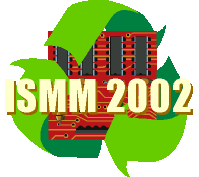

| Submission deadline: | February 8, 2002 |
| 5pm, US Eastern Standard Time (-4 hours UT) | |
| Author notification: | March 22, 2002 |
| Camera-ready copy due: | April 20, 2002 |
ISMM is a forum for research in management of dynamically allocated memory. Areas of interest include but are not limited to: explicit storage allocation and deallocation; garbage collection algorithms and implementations; compiler analyses to aid memory management; interactions with languages, operating systems, and hardware, especially the memory system; and empirical studies of allocation and referencing behavior in programs that make significant use of dynamic memory.
ISMM 2002 continues the tradition of the successful conference series established with the International Workshops on Memory Management held in 1992 (St. Malo, France) and 1995 (Kinross, Scotland), and the ISMM symposia of 1998 (Vancouver, Canada), and 2000 (Minneapolis, USA) Proceedings of the IWMM conferences are available from Springer-Verlag (Lecture Notes in Computer Science no. 637 and no. 986), while the ISMM proceedings are published by the Association for Computing Machinery (ACM).
ISMM solicits both short and full-length papers on all areas of memory management. Survey papers that present an aspect of memory management with a new coherence are also welcome. Submissions will be read by the program committee and designated reviewers and judged on scientific merit, innovation, readability and relevance. Papers previously published or already being reviewed by another conference are not eligible; if a closely related paper has been submitted to a journal, the authors must notify the program chair.
Full submissions should be at most 12 pages excluding bibliography and well-marked appendices, using at least 11-point font and reasonable margins for US Letter paper. Program committee members are not required to read appendices, and so a paper should be intelligible without them. Short papers (of no more than 6 pages) will be considered for abbreviated presentation. A short paper may present results of work in progress but which are not as developed as those expected in a full paper: for example, it might offer new ideas that are intriguing but not ``fully baked'', or present useful and solid measurements. All accepted papers (both short and full) will appear in the published proceedings.
Submitted papers must be in English and formatted to print on US Letter (8.5 x 11 inches) paper. Submissions must contain an abstract and postal and electronic mailing addresses for at least one contact author. All papers must be submitted on-line, preferably in Portable Document Format (PDF), although portable PostScript will also be accepted. Instructions for on-line submission of papers will become available on the ISMM web-site given above. On-line submission of papers must occur no later than 5pm US Eastern Standard Time (-4 hours UT), February 8, 2002.
Authors will be notified of the acceptance or rejection of their papers by March 22, 2002. Final versions of accepted papers must be received in camera-ready form by April 20, 2002. The proceedings will be published by ACM. Authors should read the ACM Author Guidelines and related information. For additional information please feel free to contact the Program Chair, David Detlefs (david.detlefs@sun.com).
| General Chair | Program Chair | |||
| Hans Boehm | Hewlett-Packard, USA | David Detlefs | Sun Microsystems Labs, USA | |
| | ||||
| Steering Committee | Program Committee | |||
| Antony Hosking | Purdue U., USA | David Bacon | IBM TJ Watson, USA | |
| Richard Jones | U. Kent at Canterbury, UK | Rick Hudson | Intel, USA | |
| J. Eliot B. Moss | U. Mass. at Amherst, USA | Kathryn McKinley | UT Austin, USA | |
| Simon Peyton Jones | Microsoft Research, UK | Luc Moreau | University of Southampton, UK | |
| Ben Zorn | Microsoft Research, USA | Erez Petrank | The Technion, Israel | |
| Tony Printezis | University of Glasgow, UK | |||
| David Tarditi | Microsoft Research, USA |